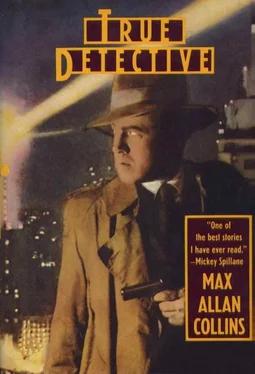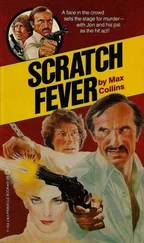Winter was over, but it was still cold. Mary Ann Beame and I set out for a Sunday drive under overcast skies that didn’t let the sun peek through once in six hours — which is how long a Sunday drive we took, starting out around noon and heading across the state toward the Mississippi River and the Tri-Cities, where Mary Ann and her lost brother Jimmy had been born and raised.
This was my first cross-country trip, and even with paved roads, I was a little uneasy about it. The ’29 Chevy had been getting me around the city well enough, but clear across the state? That suddenly seemed overly ambitious, particularly under a sky this nasty.
But soon I was going a confident 40 mph down U.S. 30, farm country whizzing by us on either side — though I did slow down for the dozen or so little towns along the way. Eviction notices in the farmyards, and out-of-business signs in store windows, said that hard times wasn’t something Chicago had cornered the market on. All that farmland, stretching out flat to the horizon, looking wasteland-barren this time of year, broken only by the occasional farmhouse/silo/barn, came as a shock to a city kid. I knew this rural world surrounded Chicago, but I’d never really seen it before, and when we pulled up to a gas station outside of DeKalb, a farmer in coveralls and floppy straw hat, his face as barren as the land, leaned against his pickup truck, which was getting filled at the next pump, and regarded us like visitors from another planet. So did a couple more farmers sitting leaned back in chairs in front of the station, chewing tobacco, apparently not minding the somewhat chilly day.
Mary Ann didn’t seem to notice these folks as anything special; she’d come from a rather rural community herself, and in fact she sat with her nose in the air, ignoring the riff raff, going high-hat like so many expatriates do when they finally condescend to come home.
She sat in the Chevy in her white hat and black-and-white-checked dress and waited for me to get her a grape Nehi from inside, where I found more farmers playing rummy at a table, drinking bottles of Zollers beer. I got two bottles of pop from the cooler and paid the attendant, a kid about twenty with red cheeks and bright eyes who asked me where I was from. I told him Chicago.
“Are those Cubs gonna take it this year?” he asked me.
He meant the pennant; first nonexhibition game of the season was this coming week.
“Wouldn’t be surprised,” I said. They’d won it last year and were favored to again.
“I been to a game in Chicago,” he said, grinning. “More’n once.”
I grinned back at him. “Me, too.”
I went out and stood by the car and handed Mary Ann in her bottle of grape pop; mine was orange. Over to one side of the station, some farm kids were pitching horseshoes.
“It’s a whole different world,” I said.
“What is?” Mary Ann asked flatly, doing her best to drink from the pop bottle with dignity.
“This is,” I said, pointing to two barefoot farm kids about eleven who were going in the station. A minute or so later, they came out, a kid clutching a half-pint of Hey Brothers Ice Cream and another with two small wooden spoons in one fist, fishing a jackknife out of a pocket with his other hand. They sat over by the slightly older kids playing horseshoes, and the kid with the knife cut the carton of ice cream in half and handed one half to the other kid, and they both dug in with the wooden spoons.
“Doesn’t that look good?” I said.
“What?” Mary Ann said.
I pointed the kids out to her again.
She made a face, said, “Too cold for ice cream,” and handed me back the empty Nehi bottle.
I finished my Nehi off, put the bottles in a wooden carton up by the door near the tobacco-chewing farmers, and gave the red-cheeked kid a buck for the gas and told him to keep the change. His face lit up like nobody had ever done that to him before, and maybe they hadn’t.
We rumbled down the road, sitting silently for maybe a hundred miles. I was irritated with Mary Ann. All day so far she had chattered about herself and her ambitions (Hollywood was figuring in her fantasies now), but when I had tried to point out the simple rustic charms of the countryside along the way, like that gas station back there, she had nothing to say — except, perhaps, “They’re just a bunch of hicks, Nathan,” or something similar.
We ate supper at a roadside café called Twin Oaks, just the other side of Sterling-Rock Falls, where we would catch Illinois highway 3. The place was busy, and we had to sit at the counter, and Mary Ann didn’t like that; she also didn’t like the looks of the greasy Greek who served us, and she didn’t like the way I looked at the young woman doing the cooking, who came out to ask me how I’d liked her pie.
“Little tramp,” Mary Ann said as we drove away.
I shrugged. “She was cute. And the cherry pie was good, too.”
“She was common.”
“What’s wrong with common?”
“Nothing, in your eyes.”
Now she was irritated with me , and didn’t speak till we hit the Tri-Cities, cutting through Moline to Rock Island, where a government bridge crossed over to Davenport, connecting also to the nearby Rock Island Arsenal. The riverfront, on the Illinois side anyway, was given over to railroad tracks and factories; what residential sections we saw seemed to be nothing special — these were workingman’s towns, or had been before times got bad. As we crossed the black steel bridge, the lock and dam on either side, the Mississippi below looked dark and choppy. A lot like the sky.
We turned left into Davenport, through a warehouse district and into the downtown. It seemed puny to me, like a scale-model of Chicago that might be displayed at the fair next month. The tallest building, which was maybe twenty stories, of which a good portion was a clock tower, had a beacon light, sort of a pocketwatch version of the Lindbergh Beacon atop the Palmolive Building. But to somebody not Chicago-bred, the Tri-Cities might have seemed like a metropolis — Davenport’s population alone was sixty thousand, Mary Ann said, third largest city in Iowa — and the five or six blocks of shops and restaurants probably seemed like the big city to the farmers and small-town folks of the surrounding area.
Mary Ann directed me up a hill, which was Harrison Street, and had me turn to the left, up into an area where Gothic mansions perched on the bluff to look down upon the Tri-Cities; some of the mansions were starting to look a bit down at the mouth and long in the tooth — some seemed to have been turned into apartment houses. The house Mary Ann guided me toward was not one of the Gothic ones, however, but something more modern, a Frank Lloyd Wright-style two-story brown-brick affair that might best be described as a modernistic castle, right down to the art-deco turrets. Sitting at the end of the block, mansions of an earlier day all around, it perched on the edge of the steep hill that fell sharply to a side street below. I pulled into a paved driveway that curved around to a double garage and left the car there. I got my overnight bag and Mary Ann’s suitcase out of the rumble seat and a light went on over a side door, near the garage.
He was thin and distinguished-looking, gray-haired with a dark mustache, wearing a pale gray suit and darker gray tie and, most significantly, gray gloves. He stood in the doorway and waited for us to come to him, but his manner, as he swung open the screen door, was friendly — he had a reserved but unfeigned smile going.
We stepped into a white, modern kitchen, with a nook off to the left, and I put the bags down as Mary Ann hugged her father and gestured toward me, almost offhandedly, saying, “This is Nathan Heller, Daddy,” and left us there in the kitchen alone.
Читать дальше












